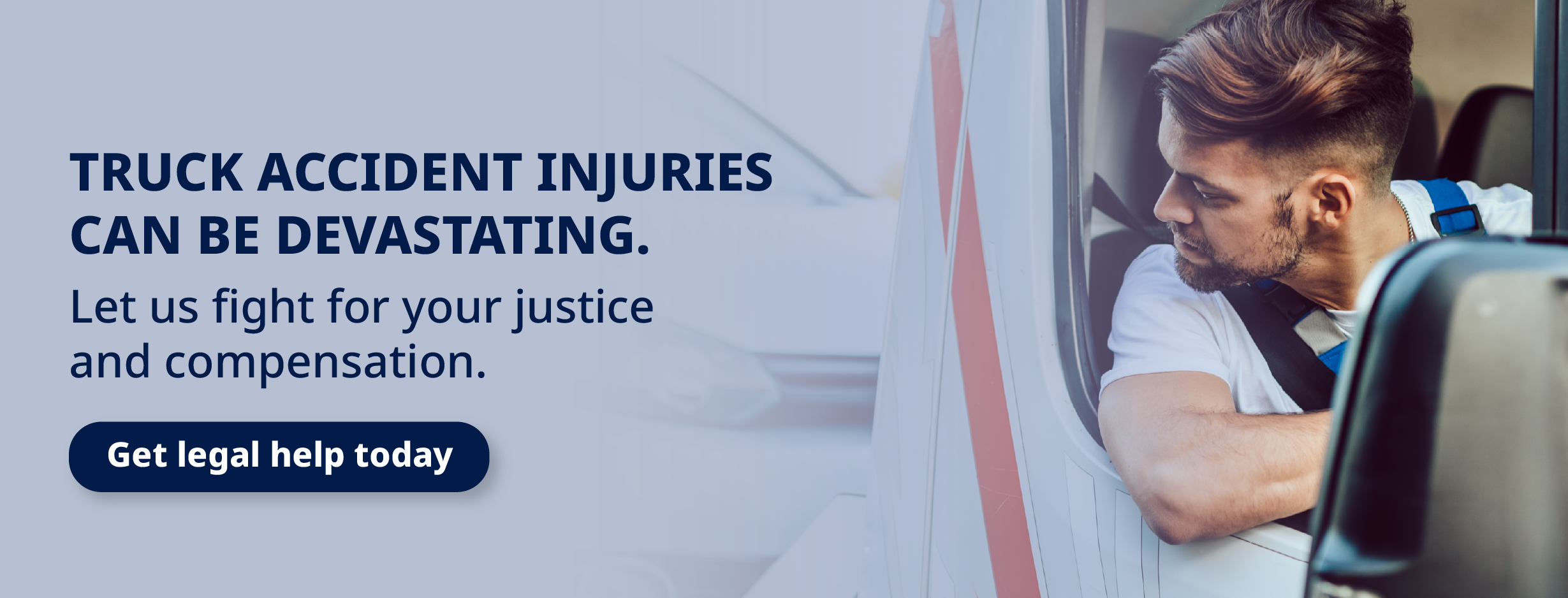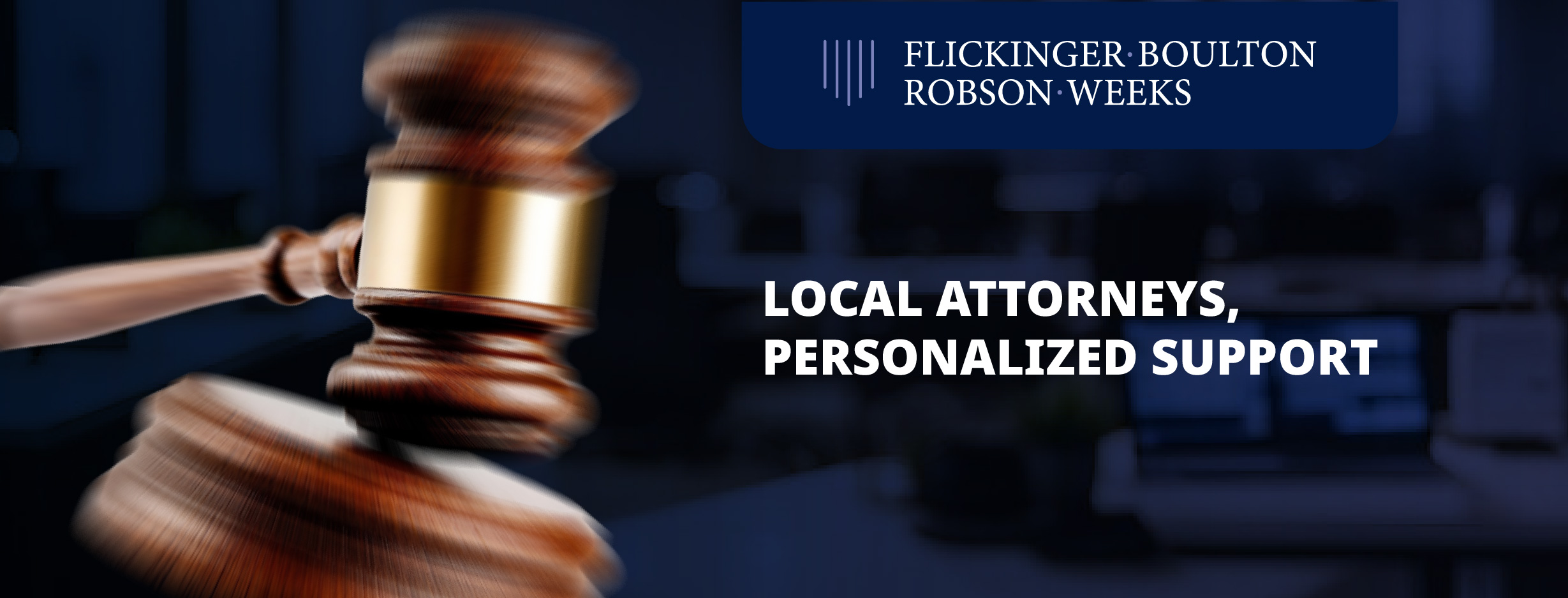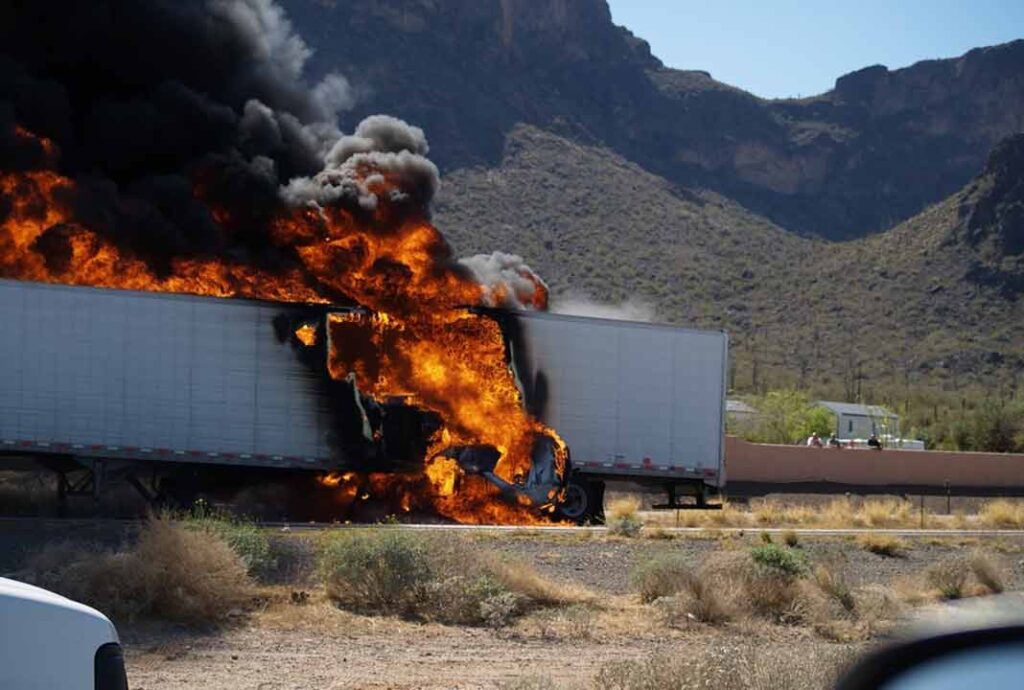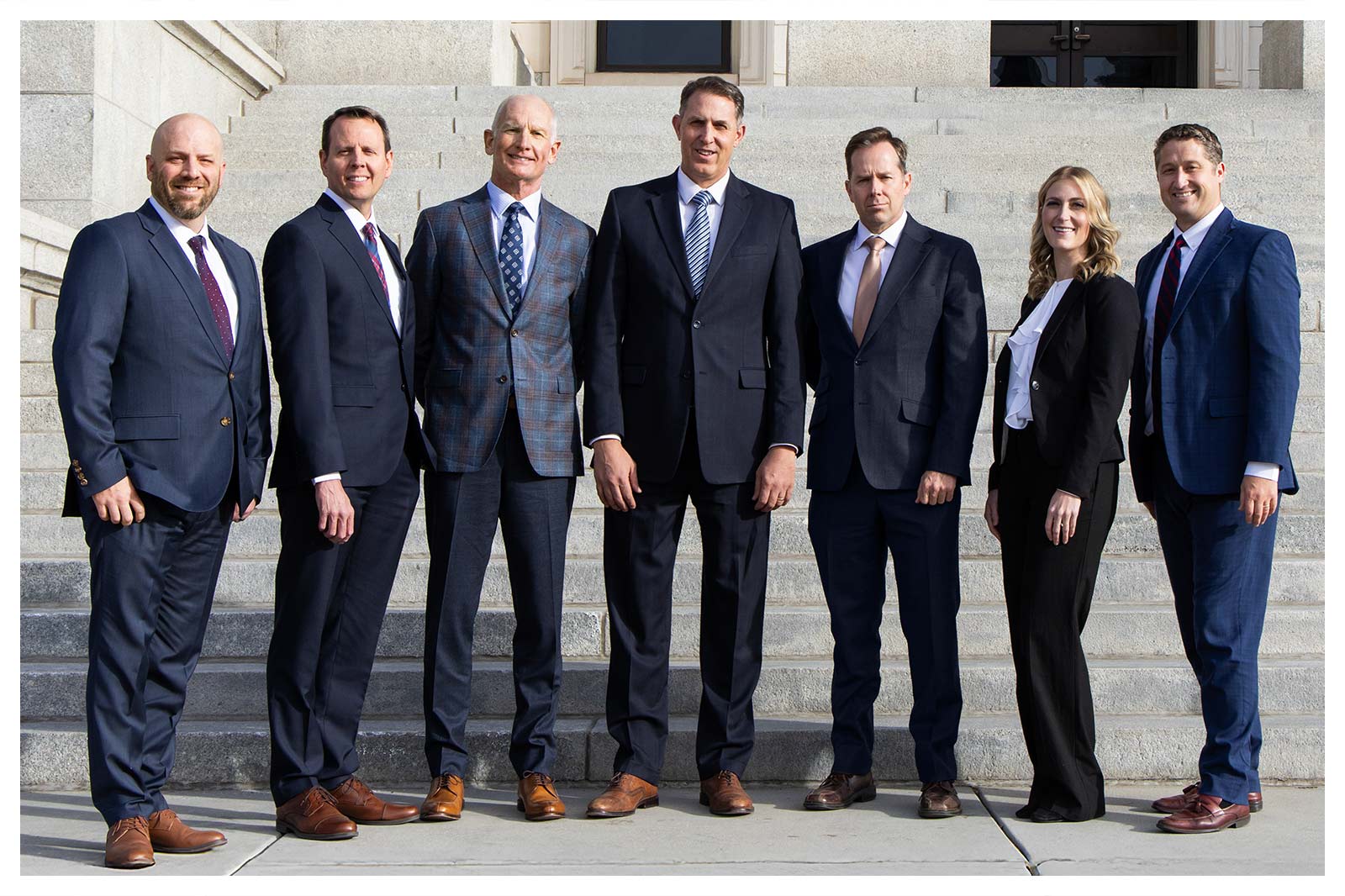¡Hablamos Español!

Truck accidents are among the most devastating collisions on Utah’s roads, often leading to severe injuries, extensive property damage, and tragic fatalities. Due to the massive size and weight of commercial trucks, victims in passenger vehicles are at a much higher risk of catastrophic harm.
If you or a loved one has been injured in a truck accident caused by negligent trucking companies, reckless drivers, or unsafe road conditions, you deserve experienced legal representation to fight for your rights.
At Flickinger Boulton Robson Weeks, our skilled Utah truck accident lawyers understand the complexities of truck accident claims, from dealing with powerful insurance companies to holding multiple liable parties accountable.
We are committed to securing the maximum compensation for medical bills, lost wages, pain and suffering, and other damages. Contact our Utah truck accident lawyers today to learn how we can help you take the following steps toward justice.
Truck accidents are a significant concern in Utah, leading to severe injuries and fatalities each year. Understanding the prevalence and impact of these accidents is crucial for promoting road safety and implementing effective preventive measures.
Recent data highlights the gravity of truck-related incidents in the state:
These statistics underscore the critical need for heightened awareness and safety measures to reduce the frequency and severity of truck accidents in Utah.
Truck accidents can have devastating consequences due to the size and weight of commercial trucks. While accidents can happen for various reasons, some factors are more common than others. Understanding these causes can help prevent crashes and improve road safety for both truck drivers and other motorists.
Several factors contribute to the occurrence of truck accidents in Utah:
Long hours on the road can lead to decreased alertness and slower reaction times.
The use of mobile devices or other distractions can divert attention from the road.
Exceeding speed limits reduces the ability to react to sudden changes in traffic conditions.
Excess weight or unsecured cargo can cause rollovers and loss of control.
Failure to maintain vehicles can result in mechanical failures leading to accidents.
Rain, snow, and fog reduce visibility and make roads slippery, increasing the risk of crashes.
If you or a loved one has been injured in a collision caused by one of these factors, a Utah truck accident lawyer can help determine liability and fight for the compensation you deserve.

The consequences of truck accidents often extend beyond the truck drivers themselves:
Recognizing these impacts emphasizes the importance of comprehensive safety strategies to protect all road users.
To mitigate the risks associated with truck accidents, several measures can be implemented:
By focusing on these areas, Utah can work towards reducing the incidence and severity of truck accidents, ensuring safer roads for everyone.
Truck accidents can have devastating consequences due to the size and weight of commercial trucks. While accidents can happen for various reasons, some factors are more common than others.
Understanding these causes can help prevent crashes and improve road safety for both truck drivers and other motorists.
One of the leading causes of truck accidents is driver fatigue. Long-haul truck drivers often work extended hours to meet tight deadlines, leading to exhaustion and decreased reaction times. Although federal regulations limit the number of hours a truck driver can operate, violations of these rules are common, increasing the risk of crashes.
Like all motorists, truck drivers can become distracted while behind the wheel. Common distractions include:
Given the size and momentum of a truck, even a few seconds of inattention can lead to catastrophic accidents.
Trucks require more time and distance to stop than smaller vehicles, making speeding especially dangerous. Some truck drivers exceed speed limits to meet delivery deadlines, increasing the risk of:
Trucks must be regularly inspected and maintained to ensure they operate safely. When companies or drivers fail to perform proper maintenance, mechanical failures can cause accidents. Common maintenance-related issues include:

Trucks carrying excess weight or improperly secured cargo pose a significant danger on the road. Overloaded trucks are more complicated to control, and shifting cargo can cause rollovers or cargo spills that create hazards for other vehicles.
Although commercial truck drivers must adhere to strict drug and alcohol regulations, some still operate under the influence. Impaired driving reduces:
Adverse weather, such as rain, snow, fog, or ice, can significantly affect a truck’s ability to stop or maneuver safely. While truck drivers are trained to handle challenging conditions, driving too fast for road conditions is a common mistake that leads to crashes.
Truck accidents occur for a variety of reasons, including driver fatigue, distractions, poor maintenance, and overloaded cargo. Because these crashes often result in severe injuries and fatalities, trucking companies and drivers must follow safety regulations and take precautions on the road.
If you’ve been injured in a truck accident, seeking legal help can ensure you receive the compensation you deserve.

Truck accidents often involve complex legal issues due to the extensive regulations governing the trucking industry. Both federal and Utah state laws establish guidelines that truck drivers and trucking companies must follow to ensure safety and prevent accidents.
When these regulations are violated, they can serve as key evidence in determining liability in truck accident cases.
The Federal Motor Carrier Safety Administration sets regulations that apply to all commercial trucks operating across state lines, including those in Utah. Some of the most essential FMCSA rules include:
In addition to federal laws, Utah enforces state-specific trucking regulations that impact accident cases. These include:
When truck drivers or trucking companies violate federal or state regulations, it can be used to prove negligence in an accident claim. A truck accident lawyer can investigate:
Federal and state trucking regulations play a crucial role in Utah truck accident cases. Violations of these laws can be strong proof of negligence, helping accident victims secure rightful compensation.
If you’ve been injured in a truck accident, an experienced attorney can investigate whether regulatory violations contributed to your crash and fight for the compensation you deserve.

Truck accidents are often legally complex because multiple parties are responsible for the crash.
Unlike standard car accidents, where liability typically falls on one or both drivers, commercial truck accidents often involve trucking companies, cargo loaders, and even vehicle manufacturers.
Determining who is at fault requires a thorough investigation, and understanding the different factors that contribute to liability is essential for building a strong claim.
A Utah truck accident lawyer will investigate the following potentially liable parties:
Truck accidents often involve more than one liable party, depending on the cause of the crash. Potentially responsible parties include:
Several factors contribute to truck accidents, and each one helps determine liability. Some common causes include:
Establishing fault in a truck accident requires substantial evidence to determine who was negligent. Investigators and attorneys rely on the following:
Utah follows a modified comparative fault system, meaning accident victims can recover compensation only if they are less than 50% at fault. However, if the trucking company or another party tries to shift blame, it can reduce or eliminate your settlement. This is why having an attorney is crucial to counter unfair fault assessments.
Determining liability in a Utah truck accident requires an in-depth investigation into driver negligence, trucking company policies, equipment maintenance, and federal regulation compliance. With multiple parties potentially at fault, accident victims must gather strong evidence and fight against insurance company tactics that shift blame.
If you’ve been injured in a truck accident, consulting with an experienced attorney can ensure that the right parties are held accountable and that you receive the compensation you deserve.
Truck accident claims are often more complicated than regular car accident claims, mainly due to the involvement of multiple parties, high insurance policy limits, and aggressive defense tactics from trucking companies and their insurers.
Understanding the common challenges in truck accident insurance claims can help victims prepare for obstacles and ensure they receive fair compensation.
Unlike passenger vehicle accidents, where one or two insurance policies are typically involved, truck accidents often include:
Each insurer tries to shift blame to avoid paying out, leading to delays and disputes over liability.
Trucking companies are required by federal law to carry higher insurance coverage than standard vehicles due to the severity of truck accidents. Depending on the type of cargo, commercial trucks must have a minimum liability policy between $750,000 and $5 million.
Because of these high limits, insurance companies fight aggressively to minimize payouts, often using the following tactics:
Insurance companies often try to reduce compensation by downplaying injuries. They may claim:
Having comprehensive medical records and expert testimony can help counter these arguments.
Utah follows a modified comparative fault rule, meaning that victims can only recover compensation if they are less than 50% at fault. Insurance companies use this rule to their advantage by trying to increase the victim’s percentage of fault.
For example, they may argue that:
Truck accident claims often involve complex federal regulations, such as hours-of-service rules, cargo weight limits, and required maintenance checks. A trucking company may be held liable if it violated any of these regulations. However, insurance companies often try to withhold critical evidence, such as black box data and driver logs, to avoid responsibility.
Insurance companies use a variety of tactics to reduce or deny truck accident claims, from shifting blame to disputing injury severity. Victims need strong legal representation to fight back because multiple insurers are often involved, and large sums of money are at stake.
If you’ve been injured in a truck accident, working with an experienced Utah truck accident lawyer can help ensure you receive the compensation you deserve.

Truck accidents can be devastating, often resulting in severe injuries, extensive property damage, and long-term consequences for victims. Taking the right steps immediately after a truck accident in Utah is crucial to ensuring your safety, preserving evidence, and protecting your legal rights.
If you have been involved in a truck accident in Utah, taking the right steps can help protect your health and legal rights:
Your health and safety are the top priority. Check yourself and others for injuries and call 911 immediately to report the accident. Even if you feel fine, truck accidents can cause delayed injuries, such as whiplash or internal trauma, so seeking medical attention is essential.
Emergency responders will:
Provide medical care to those injured.
Secure the accident scene to prevent further collisions.
File an official police report, which will be crucial for your claim.
If the accident is minor and your vehicle is drivable, move it to the side of the road to avoid further collisions. However, if you or others are seriously injured, stay inside your vehicle until help arrives unless there is immediate danger (e.g., fire or leaking fuel).
Collecting detailed information from the truck driver is crucial for your claim. Be sure to obtain:
Unlike regular car accidents, trucking companies and cargo loaders may also be liable, so documenting all involved parties is essential.
Truck accidents involve multiple parties and insurance companies, so having clear evidence can protect your claim. Capture:
If possible, record witness statements and obtain their contact information. Witness testimony can be critical in proving liability.
Insurance adjusters and trucking companies may use your statements against you to minimize their payout. Do not admit fault, apologize, or speculate about what happened. Stick to factual information when speaking with police officers and other drivers.
Even if you feel uninjured, some injuries take hours or days to appear. Seeking immediate medical attention:
Truck accident claims are complex due to multiple insurance policies, federal regulations, and large trucking companies fighting to avoid liability. An experienced truck accident lawyer can:
Taking the right steps after a truck accident in Utah can protect your health, preserve critical evidence, and strengthen your legal claim. Seeking medical attention, gathering evidence, and contacting an experienced truck accident lawyer can make a significant difference in securing the compensation you need to recover.
If you’ve been injured in a truck accident, reach out to a skilled attorney as soon as possible to protect your rights.
Victims of truck accidents in Utah may be entitled to various forms of compensation, including:
A Utah truck accident lawyer will work tirelessly to ensure you receive the maximum compensation possible.
At Flickinger Boulton Robson Weeks, we understand that truck accident cases are more complex than typical car accident claims due to the involvement of multiple parties, federal regulations, and high-stakes insurance policies.
To secure the maximum compensation for our clients, our Utah truck accident lawyers take a strategic, evidence-based approach to building strong cases.
Truck accident cases require immediate and detailed investigations to gather evidence before it is lost or altered. Our legal team works quickly to:
Because trucking companies and insurers often try to withhold crucial evidence, we take aggressive legal action to secure all necessary documentation.
Unlike standard vehicle accidents, truck accidents may involve multiple liable parties, each with different insurance policies. Our firm carefully examines the following:
By identifying all responsible parties, we ensure victims pursue full compensation from every liable source.
To strengthen a truck accident case, we collaborate with industry experts who provide professional analysis, including:
Professional testimony adds credibility and weight to our client’s claims, making it harder for insurance companies to dispute liability or damages.
Trucking companies carry high-value insurance policies, which means their insurers fight aggressively to limit payouts. Our attorneys:
We prepare every case as if it’s going to trial, which often forces insurers to offer fair settlements rather than risk court losses.
If settlement negotiations fail, our firm is fully prepared to take the case to court. We have extensive litigation experience and are not afraid to challenge large trucking corporations before a judge and jury.
By presenting strong evidence, expert testimony, and compelling legal arguments, we fight to secure the best possible outcome for our clients.
Building a strong truck accident case requires extensive investigation, expert analysis, and aggressive legal advocacy. At Flickinger Boulton Robson Weeks, we take a meticulous and strategic approach to ensure our clients receive the compensation they deserve. If you or a loved one has been injured in a truck accident, contact us today for a free consultation, and let a Utah Truck Accident Lawyer fight for your rights.
The Utah statute of limitations for filing a personal injury lawsuit after a truck accident is four years from the date of the crash. However, if the accident results in a wrongful death, the victim’s family has only two years to file a claim.
It is crucial to begin the legal process as soon as possible because evidence can disappear, and trucking companies may destroy records if a claim is not filed quickly.
Pedestrians and bicyclists are especially vulnerable in truck accidents, and injuries are often catastrophic. If you are struck by a commercial truck while walking or biking in Utah, you can file a personal injury claim against the truck driver, trucking company, or other liable parties.
Because trucks have large blind spots, pedestrian and bicycle accidents often occur when a truck is:
Pedestrians and cyclists have the right of way in many situations, so truck drivers can often be held liable if they fail to exercise caution.
If a trucking company or its insurance representative reaches out to you after an accident, proceed with caution. They may try to:
Do not agree to anything or provide a recorded statement until you consult with a truck accident lawyer. An attorney can protect your rights and ensure you don’t accept an unfair offer.
Yes. Even if the truck driver is an independent contractor, you may still have a claim against:
Trucking companies often try to distance themselves from liability by arguing that their drivers are independent contractors, but a lawyer can investigate whether they are still legally responsible.
If a truck driver flees the scene of an accident, it is considered a hit-and-run, which is a serious crime in Utah. If this happens:
Police will investigate, but an experienced attorney can help you explore all compensation options even if the driver is not found.
Utah truck accidents involve many unique legal challenges, from hit-and-run cases to trucking companies shifting liability. Understanding your rights and seeking legal guidance early can help you recover the compensation you deserve. If you have more questions, contact an experienced Utah truck accident lawyer to discuss your case.


The truck accident claims process technically begins at the scene of the accident since that is where you’ll gather most of the evidence you’ll use in the claims process. The first thing you’ll want to do is call 911 to report the accident. Police will come to the scene and fill out a report. You’ll want to get a copy of that report. It will help you with the insurance claims process.

Ambulances usually accompany police to the accident scene. Even if the accident seems minor, a driver or passenger could be injured. Emergency first responders will provide an on-site physical examination to detect any injuries. Anyone who’s injured will be transported to the hospital for further care.

It’s critical to document everything. To begin, you’ll want a photo of the other driver’s ID and auto insurance cards, as well as pictures of the accident scene. Take pictures from every angle you can so that you have plenty of evidence showing how the accident happened. Take photos from your angle as well as the other driver’s angle. Get up-close and far-away shots of the accident and, most importantly, the damage.
The truck accident claims process involves your injuries, too. If you are injured, having documentation of your injury at the accident scene will help prevent the other driver’s insurance company from claiming that your injuries are unrelated to the accident.
If you are injured but not enough to go to the hospital, go to your primary care provider or local urgent care. This will create a chain of evidence linking your injuries to the accident.
Whose insurance company you call depends on where you live and who was at fault in the accident. In Utah, accidents are “no-fault,” meaning that you report the accident to your insurance company regardless of who hits who. They will pay for a portion of your car repairs and medical bills. Your policy determines the amount they pay.
Utah also has a “comparative negligence” law that works in tandem with its no-fault status. This means that both drivers can be at fault to different extents. If you are less than 50% responsible for an accident in Utah, you can collect compensation for the accident.
If you live in an “at-fault” state, the driver who caused the accident is responsible. Sometimes, blame is 100% one driver’s fault, but it can be 50/50 or unequal. For example, it could be 60/40 or 80/20.
In an at-fault state, this means that both parties are partially responsible. The more fault you have, the more your insurance company will pay the other driver. If you’re 80% responsible for the crash, then your insurance company will pay for 80% of the other driver’s costs. But, in an at-fault state, you can collect 20% of damages from the other party if you’re only 80% responsible.
Being partially or wholly responsible for an accident in an at-fault state is not good since it will cause the cost of your insurance to go up.
Many people assume that the truck driver is responsible for an accident. While this is true in some cases, it’s not a blanket statement for every scenario. Several factors can cause an accident between a truck and a car, including distracted driving, intoxication, speeding, drowsy driving, vehicle malfunctions, inexperience, inclement weather, and much more. Anyone can be responsible for these accidents.
It is often assumed that truck drivers are at risk of severe injuries in a crash, but they are actually better protected than passenger vehicle occupants. Commercial trucks are more robust, sturdy, heavier, and higher up than regular vehicles. Because of this, many truck drivers can walk away from a crash without significant injuries.
Many people think truck drivers are superior because of their commercial driver’s licenses, but this does not make them immune to errors. Truckers can easily make mistakes in the rush to get goods delivered on time. Truck drivers are not always highly experienced and can accidentally cause a wreck.
In many truck accidents, trucking company negligence is the cause of preventable tragedies. Don’t let the company convince you that they cannot be held liable for their driver’s actions. Here are a few reasons why a trucking company might be responsible for an accident:
It’s a common misconception that insurance companies will fairly compensate you in the event of a crash; sadly, this isn’t always the case. Often, their offer is well below what you truly deserve. An attorney will help guide you in this process handle all negotiations on your behalf.
Drug use
Speeding
Unfamiliar with Route
Over-the-counter Medications
Failure to Check Blind Spots
Driver Fatigue
Failure to observe safety measures like signaling turns
Driver distractions
Improper estimates of evasive action
Road Rage
One of the significant differences between semi-truck accidents and car accidents is the severity of injuries. Due to a semi-truck’s size and weight, accidents involving them often result in more severe injuries or fatalities than car accidents.
A semi-truck can weigh up to 80,000 pounds, while the average passenger car weighs around 2 tons — or 4,000 pounds. This means that in a collision, the impact is much greater for the smaller vehicle and its occupants. Additionally, semi-trucks have a much larger blind spot than cars, making it more difficult for truck drivers to see other vehicles, increasing the risk of accidents.
Injuries that are commonly sustained in semi-truck accidents include:
These types of injuries can have long-term effects on the victim’s health and — in some cases — may even result in permanent disability or death.
The size and weight of semi-trucks can also cause significant damage to other vehicles and property, which can add to the overall cost of the accident.
Another key difference between semi-truck accidents and car accidents is the complexities that can arise in insurance and liability issues. Semi-trucks are commercial vehicles and are typically owned and operated by companies or individuals who are in the business of transporting goods. As a result, the insurance and liability issues can be more complex than in a car accident.
In a semi-truck accident, multiple parties may be held liable, including the truck driver, the trucking company, and even the company that owns the cargo being transported. Determining who is at fault for the accident can be a complex process, as it may involve investigating the actions of multiple individuals and entities.
The trucking company’s liability may be affected by federal regulations, such as hours of service rules and maintenance requirements, which can add to the case’s complexity.
Due to the potential for large payouts in semi-truck accident cases, insurance companies may be more likely to contest liability and fight against large settlements. This can make the process of obtaining compensation for injuries and damages more difficult for victims and their families.
Semi-truck accidents, historically, have been caused by a variety of factors, such as the following:
Car accidents are most often caused by factors such as driver distraction or impairment.
Another way semi-truck accidents and car accidents differ is the investigation process. Semi-truck accidents often require a more extensive investigation than car accidents, as multiple parties may be involved, and federal regulations may apply.
When semi-truck accidents occur, investigations typically involve interviewing the truck driver, examining the truck and its maintenance records, and reviewing any electronic data recorders or cameras that may have captured the accident. The cargo being transported and its condition before the accident will also be a point of examination.
Federal regulations, such as hours of service rules and maintenance requirements, also come into play during the investigation process. These regulations are in place to ensure the safety of the truck and its driver, and failure to comply with these regulations can lead to liability for the trucking company and the driver.
The investigation process can take several months, and the results can be used to determine liability and help inform the legal process. The National Transportation Safety Board (NTSB) also investigates significant accidents — like those involving fatalities — in which federal regulations were violated or any other accidents that can be used as a case study to improve transportation safety.
Laws and regulations surrounding commercial vehicles can be complex, requiring specialized legal representation for those involved in such accidents.
An attorney with experience in semi-truck accident cases will advise clients on the potential value of their case and can negotiate with insurance companies and other parties involved in the case to ensure that the client receives fair compensation for their injuries and damages.
While many lawyers are comfortable settling out of court, our personal injury lawyers are always prepared to go to trial if it means getting our clients the compensation they deserve.
We've got a team of private investigators ready to roll up their sleeves and dig into the details to back up our clients’ cases. This is crucial when dealing with semi-truck accidents. Getting all the facts can determine who is at fault.
We issue subpoenas to the phone company of the responsible driver. These records serve as crucial evidence, revealing whether the driver was texting or talking on the phone at the time of the incident.
Surveillance cameras can collect critical evidence that can make a case, illuminating events leading up to the tragedy. Our legal team takes the initiative in gathering and conserving this critical evidence.

When it comes to litigating claims involving truck accidents, the personal injury attorneys of Flickinger • Boulton • Robson • Weeks work tirelessly to ensure that justice is achieved.
Contact Utah’s leading legal team today to arrange for an evaluation of your auto accident case. We would be pleased to advise you of your legal rights and options.
Call our office at (801) 500-4000 to schedule a consultation or discuss your case.